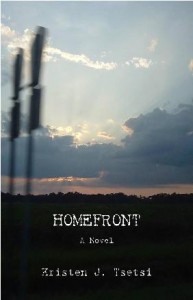 There’s something about discovering a great self-published novel that’s different than discovering a novel that’s traditionally published, no matter how small the press. On the hand, you’re happy to have found something good, on the other hand you think, “Why did this have to be self-published?” For anyone who thinks that if a book is great it will find a publisher is just wrong and Kristen Tsetsi’s Homefront is the perfect example.
There’s something about discovering a great self-published novel that’s different than discovering a novel that’s traditionally published, no matter how small the press. On the hand, you’re happy to have found something good, on the other hand you think, “Why did this have to be self-published?” For anyone who thinks that if a book is great it will find a publisher is just wrong and Kristen Tsetsi’s Homefront is the perfect example.
It may be understandable why the novel didn’t find takers – though the novel’s about the biggest thing imaginable, war, there’s no great overwhelming dramatic arc – no one commits crimes, there’s no murder or other plot device – but there doesn’t have to be. The dramatic arc is in the prose itself, how the book is written, and how every sentence is deeply felt and evocative.
But this is what’s happened to the publishing industry. Instead of editors seeing that a writer like Kristen Tsetsi is as sincere and gifted as they come, they worry if a book is immediately marketable – even if the power of such good writing should be marketable in itself. Great writers should be nurtured, and hopefully this is the first step in the process. But enough about the failings of the publishing industry. On to the book:
What makes Homefront so powerful is that it is not an explicitly anti-war novel, or pro-troops novel. Certainly, it’s about the struggles of those left back on the homefront while their love ones fight overseas. But also the novel is universal: it can be read and understood by anyone who’s been in a long distance relationship, or knows someone who’s faced a terminal illness, or, frankly, anyone who’s missed somebody, while at the same time providing a precise window in that can only be understood by those who have experienced wartime directly. That is an amazing balance: both the universality and the uniqueness of what these characters are feeling.
Mainly the novel’s about having a deep love for someone you worry about and having that love twisted into self-doubt and some self-destruction. Mia, the main character and narrator, responds to Jake being away at war, and possibly killing people, by being destructive herself: drinking too much, impulsively and negatively responding to those close to her. But this is never stated outwardly: she never says, “Jake was away at war, so I thought I’d destroy things of my own.” The furthest Tsetsi goes is in passages like this one:
“…much of the city taken. Meanwhile, the administration applying pressure to stop supporting enemy…”
Major operations over, they say, but still no phone call.
Cleanup and advancing might be all that’s left. Air Force planes have been sent off, away, home, and someone, somewhere, was captured. Someone big and important, they said. Or was the someone killed?
I wonder if Jake has killed anyone. Killed anyone, Jake, killed, and wonder if I would think it sexy or sad.
I pull up the blankets and try to sleep.
Mostly, her reaction to the war is implied by her actions, which is why this novel is not just about war, it’s about relationships in general, and can be appreciated by anyone. None of this would be nearly as effective if Tsetsi weren’t such a great writer. Every sentence shows care, and she says a lot with very little.
Denise trails her finger under her lampshade fringe on the way to the car and says something about how the sunlight makes it sparkle. She’s decorated, too. Prettied-up in glinting red dangles and a white cotton tapestry, her legs upholstered in denim. Her new necklace, platinum, dips between her breasts, expensive garland. While the jewelry store cashier rang it up, Denise had winked at me and said, “Hazard pay.”
A passing man in the parking lot smiles at her and Denise smiles back, says “Hi.”
Her ‘hi’ sounds single.
That last sentence sets up the woman’s relationship with another man, while her husband is fighting overseas. But Tsetsi does not have to say anything other than “Her ‘hi’ sounds single” for you to know exactly what she’s talking about, and exactly how the character, Denise, is acting and feeling. When you use the word “spare” to talk about prose, it sometimes sounds like a pejorative, as does the word “minimalist.” It implies possibly that the writer didn’t take the time. But here you get the sense that Tsetsi’s been careful with every word and no sentence has been wasted.
Kristen Tsetsi is the real thing. This isn’t a great self-published novel, it’s a great novel. Read her fiction posted online and her blog and discover one of the better writers you are likely to read.
These quotes from other readers will give you a sense of the novel’s effect:
“So many times I found myself clutching at my chest at the terrible pain I was feeling…because my wife, back on the homefront, couldn’t understand what I was expressing to her. The truth is she was expressing things to me that, until reading Homefront, I just didn’t understand. Homefront is powerful.”
– Andrew A., US Army Officer
“Tsetsi’s observations are keen, and to say that she possesses the gift of subtlety would be an understatement. Her sentences are whittled down to their essentials and yet they are loaded; not telling you much, but also telling you everything.
“I have read the book three times since it was released.”
– Beth Kernaghan, Artist and Army wife, Fort Rucker, AL
“Often forgotten amid yellow-ribbon bumper stickers and Welcome Home ceremonies, Kristen Tsetsi’s Homefront renders love and the very capacity to love as casualties of war, all in prose glittering with humility, humor and incisive detail.”
-Benjamin Buchholz, author of Private Soldiers
Read Kristen Tsetsi’s interview at the Self-Publishing Review. Buy the book at Lulu or Amazon.
Get an Editorial Review | Get Amazon Sales & Reviews | Get Edited | Publish Your Book | Enter the SPR Book Awards | Other Marketing Services






















I really enjoyed Homefront; reading it gave me the same sort of feeling I get from Margaret Atwood (when she’s not in dystopian mode) and Janet Fitch. Terrific stuff.